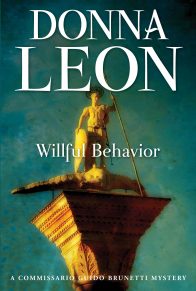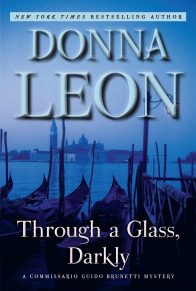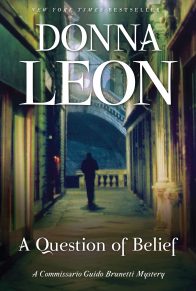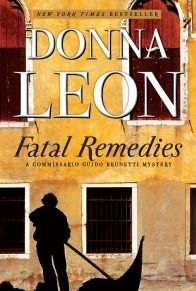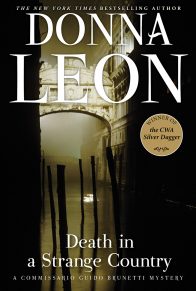“Despite the serious issues they raise, Leon’s books shimmer in the grace of their setting and are warmed by the charm of their characters. As a thinking man, Brunetti reads Cicero for moral direction, looks to his wife for doses of cynical realism and humbly consults his secretary, the terrifyingly efficient Signorina Elettra, on practical matters. But it is as a man of sensibility that this endearing detective most engages us. On his slow walks through Venice, he will go out of his way to exchange greetings with a myna in a pet shop or admire a woman’s legs in a coffee bar—quietly celebrating the way life goes on, even in an unjust world.” —Marilyn Stasio, The New York Times Book Review
“For those who know Venice, or want to, Brunetti is a well-versed escort to the nooks, crannies, moods and idiosyncrasies of what residents call La Serenissima, the Serene One. . . . Richly atmospheric, [Leon] introduces you to the Venice insiders know.” —Ellen Hale, USA Today
“Uniform Justice is a neat balancing act. Its silken prose and considerable charm almost conceal its underlying anger; it is an unlovely story set in the loveliest of cities. . . . [Donna Leon] is indeed sophisticated, and perhaps subversive, but you might find her novel’s leisurely pace, political concerns and cultural ruminations to be a welcome break from the ultra-violent assaults that confront us in much of today’s crime fiction.” —Patrick Anderson, The Washington Post
“There’s atmosphere aplenty in Uniform Justice . . . Brunetti is a compelling character, a good man trying to stay on the honest path in a devious and twisted world.” Jody Jaffe, The Baltimore Sun
“Venice provides a beautifully rendered backdrop for this operatic story of fathers and sons, and Leon’s writing trembles with true feeling.” —Erin Hart, The Minnapolis Star-Tribune
“One of the best of the international crime writers is Donna Leon, and her Commissario Guido Brunetti tales set in Venice are at the apex of continental thrillers. . . . [Uniform Justice] is a subtle but harrowing look at the price of conscience, the fears we have for loved ones in a malignant world and the price to be paid for insisting on answers and justice. The author has written a pitch-perfect tale where all the characters are three-dimensional, breathing entities, and the lives they live, while by turns sweet and horrific, are always believable. Let Leon be your travel agent and tour guide to Venice. It’s an unforgettable trip.” —Peter Mergendahl, The Rocky Mountain News
“Set in a cold and gray Venice, this is a must-read for Leon’s fans.” —Beverly Close, The Portland Oregonian
“Events are powered largely by Leon’s compelling portraits.” —P.G. Koch, The Houston Chronicle
“The plot is silky and complex [and] the main appeal is the protagonist, Brunetti. . . . One hopes that American publishers will make this entire series available, so readers can tag along with Brunetti from the beginning.” —Michele Ross, The Cleveland Plain-Dealer
“Leon, a wonderfully literate writer, sets forth her plot clearly and succinctly. . . . The ending of Uniform Justice is not a neat wrap-up of the case with justice prevailing. It is rather the ending one would expect in real life. Leon says that ‘murder mystery is a craft, not an art,” but I say that murder mystery in her hands is an art.” —Margaret Grayson, The Roanoke Times
“Leon skillfully keeps us, and the intrepid commissario, tantalizingly puzzled by this sad and unlikely death. . . . And you’ll be spellbound by all the studied menace and subterfuge Leon suggests is cultivated even today in a historic metropolis built almost literally, after all, from muddied waters. You won’t get the Venice of the guidebooks in Uniform Justice, but you’ll probably learn more in 259 pages about one of the world’s few genuinely unique cites than you would in 259 afternoons spent sipping Campari in Piazza San Marco.” —Rod Cockshutt, Raleigh News & Observer
“In evocative, psychologically astute prose, Leon reveals the many levels of irony in her title. The conclusion is brutal and worldly wise. . . . [Uniform Justice] is a swift, beautifully written mystery that will leave you nodding your head in yet another picture of a world where audacity and mendacity rule in utter contempt for everything else.” —Sam Coale, The Providence Journal
“The reader will be propelled through the unfolding mystery with trust in the perspicacious but humane Brunetti and his quest for justice. Along the way readers gain valuable insight into Italian customs and politics as Leon skillfully delineates the contours of the city.” —Claire Keyes, Salem Press
“[Leon] gives us a depth of character in all her people, including her bad guys. She also trusts the intelligence of her readers by not translating every title or object from Italian. If you’re looking for a mystery novel with wit, heart and class, get to know the books of Donna Leon.” —Lois Mark Stalvey, The Sedona Red Rock News
“Superb. . . . An outstanding book, deserving of the widest audience possible, a chance for American readers to again experience a master practitioner’s art.” —Publisher’s Weekly (starred review)
“American readers, having endured seven long years without a new Guido Brunetti novel, can now celebrate the return of Leon’s world-weary Venetian commissario. . . . It’s high time this series earns the accolades in the U.S. it has been receiving in Europe for years.” —Bill Ott, Booklist (starred review)
“A powerful indictment of an Italian society.” —Kirkus Reviews
“Outstanding. . . . This is not the Venice of Thomas Mann or Henry James; Leon’s city is winter-cold and gray, with corruption rather than gilt glinting through the fog, and a culture in the grip of a Kafkaesque bureaucracy that runs on secrets and bribes. The plot flows along like the Adriatic tide through a narrow canal—swift, none-too-clean and inevitable.” —PW Daily
“Deeply sympathetic portrait of a truth-seeker at war with monied time-servers, but Brunetti’s reflections giving point and poignancy to the conflict.” —Literary Review
“There is the joy of contemplating Venice: the veiled and ancient heroine, with a sad haunted beauty slipping away year by year. Read it in the dusk, with a grappa.” —Libby Purves, The Good Book Guide
“[Uniform Justice] marks the 12th appearance of Leon’s Venetian police Commissario, Guido Brunetti, a thoughtful, reflective family man who happens to pursue criminals. This series is addictive, partly because of the appealing Guido, who is as reverent about what is fresh at the Rialto market that morning as about seeing justice done.” —Joan Feeney, Bell”Italia
“[Brunetti] long ago joined the ranks of the classic fictional detectives.” —T.J. Binyon, The Evening Standard (UK)
“Classic, classy detective fiction, with its unique Venetian setting and a humane and down-to-earth protagonist.” —Manchester Evening News (UK)
“Wonderfully familiar characters, a powerful sense of place and expert plotting makes this 12th appearance of the down-to-earth Brunetti—now fully recovered from his earlier wounds in Mafia territory—a page-turner with real psychological depth and a disturbing, quiet power.” —The Guardian (Manchester)
“Ms. Leon once again captures the spirit of the city and the conflict between ordinary citizens and those with power and influence.” —Susanna Yager, Sunday Telegraph (UK)
“Donna Leon has gathered a fair following with her crime novels set in Venice. A new Leon is always a treat and this is no exception . . . It’s a challenging case for Brunetti, and an enjoyable read for you.” —Paul Larkin, Sunderland Echo
“Spellbinding . . . You don’t often think of Venice as a murder city, but Donna Leon has put it well and truly on the map and in Brunetti she has a character who could do for the city what Morse did for Oxford.” —Steve Craggs, Northern Echo
“The new Brunetti novel is darker and more moving than ever before and displays Leon at her best.” —Spain Magazine
“[Uniform Justice has] a stinging and effective surprise at the end . . . It is complex and thought-provoking and lingers in the mind.” —Margaret Walters, Sunday Times (UK)





